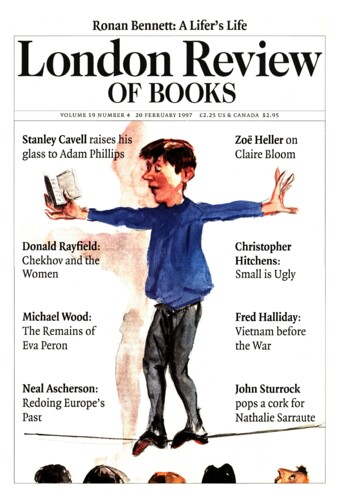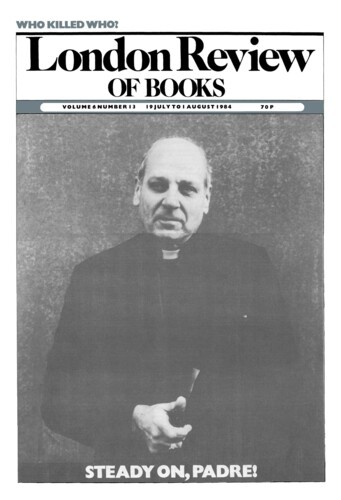Donald Rayfield
Donald Rayfield who has published books on Chekhov and Przhevalsky, is head of the Department of Russian at Queen Mary College, London.
Tongues Wagged
Donald Rayfield, 20 February 1997
When The News seeped out that Anton Chekhov, the most sought after of Russia’s eligible bachelors, had, in Moscow on 25 May 1901, married a Lutheran actress, Olga Knipper, at least a dozen women exclaimed: ‘Why not me?’ There were the painters: Maria Drozdova dropped her brushes and her palette when she heard the news, exclaiming that she thought God had reserved Chekhov as a reward for her modesty and that she hated Knipper; Aleksandra Khotiaintseva, who had entertained him when they were staying in Nice in 1898 and whom Chekhov’s youngest brother wanted him to marry, kept her disappointment to herself. There were actresses – Lidia Iavorskaia, Vera Komissarzhevskaia, and the recently widowed Daria Musina-Pushkina – who had had their sights on him for years, even decades. There were writers: Elena Shavrova, who would have been prepared to divorce her civil servant husband; Tatiana Shchepkina-Kupernik, despite her lesbian preferences. There were women of no definite profession, above all Lika Mizinova – the original Seagull – to whom Chekhov had proposed at least twice, only to retract.’
Rehabilitation
Donald Rayfield, 19 July 1984
Dostoevsky in the 1840s, a caustic and iconoclastic rising star, was the subject of Joseph Frank’s first volume of biography and critique, The Seeds of Revolt. This volume stood out from many rival studies for the thoroughness of its research, the generosity of its approach (to Dostoevsky and to other critics), its intelligent judgment of Dostoevsky’s psychology and literary intentions, and, rarest quality of all in the Dostoevsky industry, for its sheer readability. This second volume takes us forward a mere decade: from Dostoevsky’s arrest for revolutionary conspiracy in 1849, through his mock-execution, imprisonment and exile to Siberia, to his tacit rehabilitation in St Petersburg in 1859. In this period, the 1850s, however, Professor Frank’s problems are very different. First of all, Dostoevsky’s life and letters are so distant and fragmentary that there is little to discuss; secondly, the initial return to literature at the end of the 1850s is so disappointing that the critic is prompted to look elsewhere for the key to Dostoevsky’s greatness. Hence Joseph Frank has the field virtually to himself, and he ploughs it very purposefully.
Pieces about Donald Rayfield in the LRB
A Snack before I Die
James Wood, 21 August 1997
We can get a better understanding of Chekhov and his work from the notebook he kept than from any biography – even an important biography, like this one. It is a ledger of enigmas in which...
Two Sad Russians
Walter Kendrick, 5 September 1985
On 1 June 1948, Edmund Wilson sent to Vladimir Nabokov a copy of Volume VI of Havelock Ellis’s Studies in the Psychology of Sex, French edition. What had caught Wilson’s attention...
Read anywhere with the London Review of Books app, available now from the App Store for Apple devices, Google Play for Android devices and Amazon for your Kindle Fire.
Sign up to our newsletter
For highlights from the latest issue, our archive and the blog, as well as news, events and exclusive promotions.


